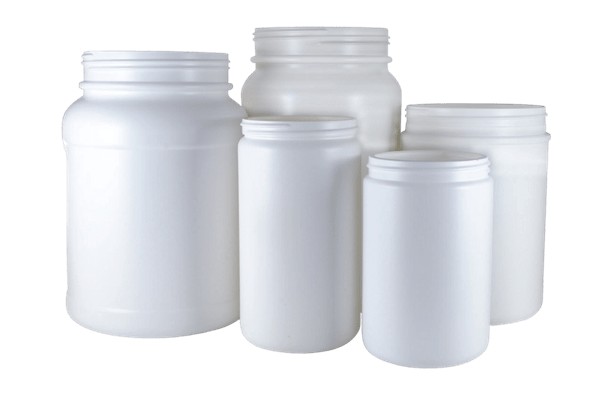The Function of Mass Plastic Containers in Effective Recycling Practices and Sustainability
Bulk plastic containers are essential to contemporary reusing initiatives. Their design enhances the performance of product collection and transport, contributing to sustainability goals. These containers not just optimize space but likewise help in checking contamination levels. Nonetheless, their execution is not without difficulties. Understanding the full range of their effect reveals a complicated connection between logistics and ecological duty that warrants further exploration.
Recognizing Mass Plastic Containers
Bulk plastic containers act as a necessary component in various sectors, promoting the storage space and transport of goods. These containers are normally made from robust products such as high-density polyethylene (HDPE) or polypropylene, which offer resilience and resistance to environmental elements. Their layout commonly includes attributes like stackability and modularity, permitting efficient usage of room during both storage and transit.
Industries such as farming, food handling, and making often make use of bulk plastic containers due to their light-weight nature and convenience of handling. The containers are available in various sizes and setups, providing to the certain needs of various products. Their versatility expands past simple functionality; they can additionally be customized with covers, handles, and identifying alternatives to improve use - Bulk Plastic Containers. Because of this, mass plastic containers play a crucial role in maximizing logistics and supply chain procedures throughout numerous markets, thereby contributing to overall effectiveness and cost-effectiveness
Benefits of Making Use Of Mass Plastic Containers in Recycling
When organizations prioritize reusing efforts, the use of mass plastic containers significantly boosts the effectiveness of the procedure. These containers are developed to optimize space, permitting the storage and transport of bigger amounts of recyclable materials. This causes less trips to reusing facilities, consequently lowering fuel usage and connected discharges.
Furthermore, mass plastic containers are resilient and resistant to various ecological factors, making sure that materials continue to be shielded during handling and transportation. Their light-weight design even more adds to reduce transport expenses.
Moreover, the uniformity of these containers helps with better sorting and processing of recyclable materials, which can boost total recycling rates - plastic bulk containers. Organizations that take on bulk plastic containers likewise show a dedication to sustainability, favorably influencing their brand name photo. Ultimately, these advantages not just improve reusing practices but also add to wider ecological objectives
Just How Bulk Plastic Containers Facilitate Product Collection
Reliable product collection is substantially enhanced by the use bulk plastic containers, as they supply a efficient and organized remedy for collecting recyclable items. These containers are made to accommodate big quantities of products, which simplifies the sorting and storage space procedure. Their stackable style optimizes space application, making it less complicated for facilities to organize recyclables without mess.
Additionally, bulk plastic containers are weather-resistant and sturdy, enabling for outdoor placement without deterioration. This strength guarantees that materials remain secured until they are collected for handling.

The uniformity in dimension and form of these containers facilitates standardization throughout collection factors, enabling much better monitoring of recyclable quantities. Their clear nature permits for simple exposure of materials, assisting in the tracking of contamination levels and assuring that only proper products are collected. In general, bulk plastic containers play a critical duty in enhancing the product collection procedure, thereby promoting effective reusing techniques.
Transport Performance and Environmental Effect
Transport performance plays a necessary duty in the recycling procedure, especially via the optimization of load capability in bulk plastic containers. By taking full advantage of the volume of material delivered, firms can significantly minimize the number of trips needed, thus decreasing their carbon impact. This strategy not just improves functional performance yet also adds to extra lasting environmental practices.

Optimizing Lots Capability
Although optimizing load capability is usually overlooked, it plays a vital function in improving transportation efficiency and lessening ecological influence in reusing methods. By making best use of the volume that mass plastic containers can hold, recycling operations can lower the variety of journeys needed for transportation. This not just decreases fuel consumption however likewise decreases the wear and tear on lorries. Effective load monitoring permits facilities to make use of area properly, ensuring that each transport cycle is as effective as feasible. Furthermore, well-optimized tons can lead to better negotiations with logistics suppliers, possibly minimizing general expenses. Inevitably, improving load capability adds to an extra sustainable recycling system by promoting efficient source use and decreasing waste created during transportation.
Decreasing Carbon Footprint
As reusing procedures undertaking to reduce their ecological influence, minimizing the carbon footprint associated with transport arises as a vital objective. Bulk plastic containers play an essential role in achieving this objective by boosting load efficiency and maximizing logistics. Their lightweight yet long lasting layout enables optimum cargo area application, minimizing the variety of trips called for to carry materials. By combining shipments, reusing facilities can decrease fuel intake and greenhouse gas discharges. On top of that, tactically finding recycling centers minimizes transportation ranges, in addition reducing carbon results. Utilizing fuel-efficient vehicles and alternate power resources enhances helpful site overall sustainability. By integrating these practices, the reusing sector can considerably lessen its carbon footprint, adding to a more sustainable future.
Challenges in the Use of Bulk Plastic Containers

Contamination Concerns
Contamination issues stand for a considerable obstacle in the effective use bulk plastic containers within reusing practices. These containers typically collect deposits from previous components, resulting in mixed materials that can hinder the reusing procedure. Pollutants such as food waste, chemicals, or non-recyclable products can compromise the stability of the whole set, resulting in increased disposal costs and decreased recycling rates. Furthermore, incorrect cleaning or sorting can exacerbate these problems, making it challenging for recycling centers to refine materials efficiently. The existence of impurities not only influences the high quality of recycled items but additionally weakens the total sustainability initiatives focused on reducing plastic waste. Attending to these contamination obstacles is vital for enhancing the efficacy anchor of mass plastic container recycling.
Recycling Facilities Limitations
Ineffectiveness in reusing framework poses significant difficulties for the reliable administration of bulk plastic containers. Lots of reusing centers do not have the ability to process huge volumes of these containers efficiently, causing boosted costs and hold-ups. Insufficient arranging technologies typically lead to contamination, as bulk containers might be mixed with various other products, making complex the recycling procedure. Restricted transportation choices additionally hinder the motion of mass plastic containers to appropriate recycling facilities, resulting in increased garbage dump waste. Furthermore, an absence of standard procedures for bulk container recycling develops complication amongst businesses and consumers, even more making complex efforts to advertise sustainability. Addressing these framework limitations is vital to boost reusing techniques and make the most of the possibility of bulk plastic containers in a circular economic climate.
Best Practices for Executing Mass Plastic Containers
When companies take into consideration implementing mass plastic containers in their recycling techniques, they must prioritize a tactical technique that enhances performance and decreases contamination dangers. First, choosing the suitable container dimension and kind is vital to fit the quantity of materials being processed. Organizations must likewise establish clear labeling and signs to guide individuals on proper disposal methods, lessening confusion and mistakes. Routine training sessions for staff can further reinforce these techniques, making sure every person comprehends their duties in preserving reusing integrity.
In addition, companies must execute a regular upkeep timetable to evaluate and tidy containers, preventing the accumulation of pollutants. Partnering with regional reusing facilities can likewise streamline the collection procedure, ensuring that products are properly processed. Lastly, companies need to check and assess their recycling metrics, using this information to improve practices gradually and advertise constant renovation in their sustainability efforts.
The Future of Bulk Plastic Containers in Sustainable Practices
As companies progressively prioritize sustainability, the role of mass plastic containers in reusing techniques is established to evolve considerably. Technologies in materials scientific research are bring about the advancement of recyclable and naturally degradable alternatives, boosting the ecological advantages of mass plastic containers. On top of that, the application of closed-loop systems will certainly enable much easier collection and repurposing of these containers, decreasing waste and source consumption.
Technical innovations, such as clever tracking systems, will make it possible for firms to monitor the lifecycle of bulk containers, enhancing efficiency in recycling processes. As customer demand for lasting techniques grows, services will likely embrace bulk plastic containers made for reuse and long-lasting value. Collaboration between governments and markets will certainly promote the facility of standardized recycling procedures, making sure that mass containers are effectively incorporated into broader sustainability initiatives. In general, the future of mass plastic containers shows up encouraging, with substantial possibility for adding to a circular economic climate.
Often Asked Inquiries
Exactly How Are Bulk Plastic Containers Made and What Materials Are Used?
Bulk plastic containers are normally made from high-density polyethylene (HDPE) or polypropylene (PP) These materials are processed through injection molding or impact molding strategies, leading to resilient, lightweight containers ideal for numerous storage space and transport demands.
Can Bulk Plastic Containers Be Recycled Numerous Times Prior To Recycling?
Yes, bulk plastic containers can be recycled several times before reusing. Their sturdiness and design enable repeated use in various applications, promoting sustainability and source efficiency while lowering the requirement for brand-new containers.

What Accreditations Exist for Mass Plastic Containers in Recycling?
Various certifications for mass plastic containers include the Recycling Partnership's certification, the Cradle to Cradle Licensed ™ criterion, and the Lasting Packaging Coalition's standards, guaranteeing containers satisfy details environmental and recyclability criteria for reliable recycling.
How Do Mass Plastic Containers Contrast to Other Recycling Storage Options?
Mass plastic containers use higher sturdiness and capability contrasted to various other reusing storage alternatives, reducing the threat of contamination and promoting efficient transport. Their design sustains better organization, boosting total performance in recycling operations.
What Is the Life-span of a Mass Plastic Container in Recycling Processes?
The life expectancy of a bulk plastic container in recycling processes usually varies from 5 to ten years, depending on usage, material quality, and environmental conditions, enabling numerous cycles of usage from this source prior to ultimate disposal or recycling.
When organizations focus on reusing initiatives, the utilization of mass plastic containers greatly improves the performance of the process. Transportation performance plays a crucial function in the reusing process, especially via the optimization of lots ability in bulk plastic containers. The use of bulk plastic containers in recycling practices encounters substantial obstacles, especially concerning contamination problems and limitations within reusing infrastructure. Contamination problems represent a substantial challenge in the reliable use of bulk plastic containers within reusing practices. When organizations take into consideration executing mass plastic containers in their recycling practices, they should prioritize a critical technique that boosts effectiveness and decreases contamination dangers.